World Humanitarian Day: What It Means to Be a Humanitarian Worker Today
Every year, on August 19th, the world celebrates World Humanitarian Day, established by the United Nations to honor all those who, often quietly, work in the most vulnerable contexts. It is a day that invites us to pause and listen to the stories of those who care for communities affected by conflicts, natural disasters, and crises—and to remember those who lost their lives while trying to save others.
The goal of World Humanitarian Day is to raise awareness of the conditions civilians face during armed conflicts or natural disasters and to pay tribute to humanitarian workers everywhere.
This year, to mark this important day, we want to share three voices from the field—testimonies from our humanitarian staff currently working in Yemen, Mozambique, and Ukraine. These are the stories of those who dedicate their days to protecting children’s rights and supporting families and communities living in emergency situations.
Through their words, we will try to convey what it truly means to be a humanitarian worker today, and why, in an increasingly unstable world, their work must never be taken for granted.
Table of contents
- World Humanitarian Day: Why August 19th?
- What Is Humanitarian Aid and What Does It Involve?
- Who Are Humanitarian Workers and Why Is Their Role Crucial?
- The Link Between Humanitarian Aid and International Cooperation
- What Is the Difference Between Humanitarian Aid and International Cooperation?
- Who Provides Humanitarian Aid?
- The Challenges of Humanitarian Aid: Voices from Helpcode Workers in the Field
World Humanitarian Day: Why August 19th?
On August 19, 2003, a bomb attack hit the United Nations headquarters in Baghdad, Iraq, killing 22 people—including the UN High Commissioner for Human Rights, Sérgio Vieira de Mello—and injuring more than 150. This tragedy deeply shook the humanitarian community and highlighted the risks humanitarian workers face every day.
That date marked a turning point in the history of humanitarian aid, sparking a new phase of awareness and stronger focus on the safety of aid workers on the ground.
It became clear that humanitarian workers themselves could also be targets in armed conflicts. Since then, the United Nations and many international NGOs have revised their safety protocols, developing stricter measures to protect staff in the field. The attack also opened up an international debate on the respect of humanitarian law (or the law of armed conflict) and the need to ensure safe and unhindered access to humanitarian aid.
In 2008, the United Nations General Assembly officially established World Humanitarian Day, choosing August 19 to commemorate the victims of the Baghdad bombing and to honor all those who dedicate their lives to saving others and protecting people in crisis. It is also a reminder that humanitarian action itself needs protection, respect, and support from the global community.
What Is Humanitarian Aid and What Does It Involve?
In times of emergency, humanitarian aid is often the only way to safeguard the fundamental rights of people affected by crises—especially the most vulnerable.
But what exactly do we mean by humanitarian aid? And what are the main activities it includes?
What does humanitarian aid mean?
Humanitarian aid encompasses all actions designed to provide support and protection to people in emergencies—such as natural disasters or armed conflicts—with the goal of saving lives and preserving human dignity. Beyond the distribution of essential goods, it also includes access to education, sanitation, and psychosocial support.
What are the main humanitarian activities?
Humanitarian activities are immediate, neutral, and non-discriminatory interventions that address the urgent needs of affected populations, regardless of ethnicity, religion, nationality, or political opinion.
They typically include:
- Distribution of food, water, and essential supplies
- Building or restoring health and education facilities
- Psychosocial support for children and families
- Emergency education activities (Discover Helpcode’s project EVERYBODY OFF TO SCHOOL in Ukraine)
- Child protection and prevention of violence, abuse, or exploitation
- Promoting access to basic services and human rights
Each intervention is part of an integrated response designed to restore safety and hope for those in vulnerable situations.
Who Are Humanitarian Workers and Why Is Their Role Crucial?
Being a humanitarian worker means working side by side with local communities in complex situations that demand not only technical expertise but also empathy, patience, and adaptability.
It means overcoming logistical, cultural, and sometimes bureaucratic or political challenges—without ever losing sight of the main goal: protecting fundamental rights and ensuring a future for those at risk of losing it.
Who is a humanitarian worker?
A humanitarian worker can be a professional or a volunteer who operates on the frontlines to bring assistance and protection to people affected by conflict or disaster.
Their roles may vary widely—from distributing essential goods to providing psychosocial support, carrying out medical interventions, supporting emergency education, ensuring child protection, managing logistics, or coordinating with local authorities.
They often work in high-risk environments that demand technical competence, adaptability, courage, and deep respect for the communities they serve.
Why Is Humanitarian Aid Still Essential?
Today, around 80% of global humanitarian needs are caused by armed conflicts.
Wars that last for years—or even decades—affect civilians disproportionately, especially children and vulnerable groups. Added to this are increasingly frequent and severe natural disasters worsened by climate change, as well as epidemics, famines, and political instability.
In this scenario, humanitarian aid remains essential, often representing the only concrete and immediate support available to millions of people who have lost everything: their homes, their livelihoods, access to essential services, and their everyday lives.
The Link Between Humanitarian Aid and International Cooperation
Humanitarian aid and international cooperation are closely connected, both part of the broader effort to improve living conditions worldwide.
Humanitarian aid is one of the three pillars of international cooperation, alongside development cooperation and peacebuilding. While humanitarian operations provide the immediate response to crises, the other two dimensions aim to create long-term conditions of well-being, security, and autonomy.
This is why Helpcode—an NGO active since 1988 in the field of international cooperation—also works in emergency contexts, to address the urgent needs of communities affected by conflict or disaster.
In Ukraine, for example, we operate in a prolonged conflict setting by building multifunctional hubs: safe spaces where children can keep studying, socializing, and receiving psychological support.
Alongside emergency responses, we also support communities through reconstruction, protection, and sustainable development, helping restore stability and future prospects. You can explore all of our projects on this page.
What Is the Difference Between Humanitarian Aid and International Cooperation?
We cannot talk about humanitarian aid without talking about international cooperation. However, there are some differences between humanitarian operations and other cooperation initiatives, mainly regarding timing, objectives, and approaches.
Humanitarian aid is an immediate, short-term response to emergencies, with the primary goal of saving lives, providing essential goods and services, and protecting human rights. It also includes interventions in education, health, and psychosocial support—and is guided by the principles of neutrality, impartiality, humanity, and independence.
International cooperation, instead, is a broader concept that includes humanitarian aid but focuses on medium- to long-term interventions aimed at fostering economic and social development within communities.
In short:
- Humanitarian aid is the rapid response to emergencies and forms part of international cooperation.
- International cooperation aims to create lasting, sustainable solutions for communities.
Who Provides Humanitarian Aid?
Humanitarian aid is delivered by a wide range of actors operating at local, national, and international levels, including:
- The United Nations, especially through agencies like UNICEF, UNHCR, OCHA, and WFP
- Non-governmental organizations (NGOs), both international and local, such as Helpcode
- The Red Cross and Red Crescent, with their vast volunteer and staff networks worldwide
The Challenges of Humanitarian Aid: Voices from Helpcode Workers in the Field
Behind every humanitarian intervention are the faces and stories of people who, with courage and dedication, work daily alongside communities affected by conflict or disaster to rebuild hope and a future together.
The testimonies of our humanitarian staff are deeply moving, because they reveal what it truly means to care for others in fragile, high-risk contexts. These voices tell the story of humanitarian aid in its most practical and most human dimension.
Yemen: The Power of Psychological Support in Humanitarian Crises
In Yemen, Afraa works as a psychologist supporting communities scarred by years of conflict. With empathy and professionalism, she creates safe spaces where children can play, express themselves, and feel like children again. Her daily commitment shows how vital mental well-being is within humanitarian interventions.
“I want people to know that humanitarian work is not just about giving food or supplies. It also includes psychological and social support that helps the whole person.”
Afraa, Helpcode humanitarian worker in Yemen
Name, role, and how long you have been working with Helpcode?
My name is Afraa Abdullah Saeed. I have been working as a Psychological Support Officer at Helpcode for three years. My job is to provide direct psychological support to people who need it.
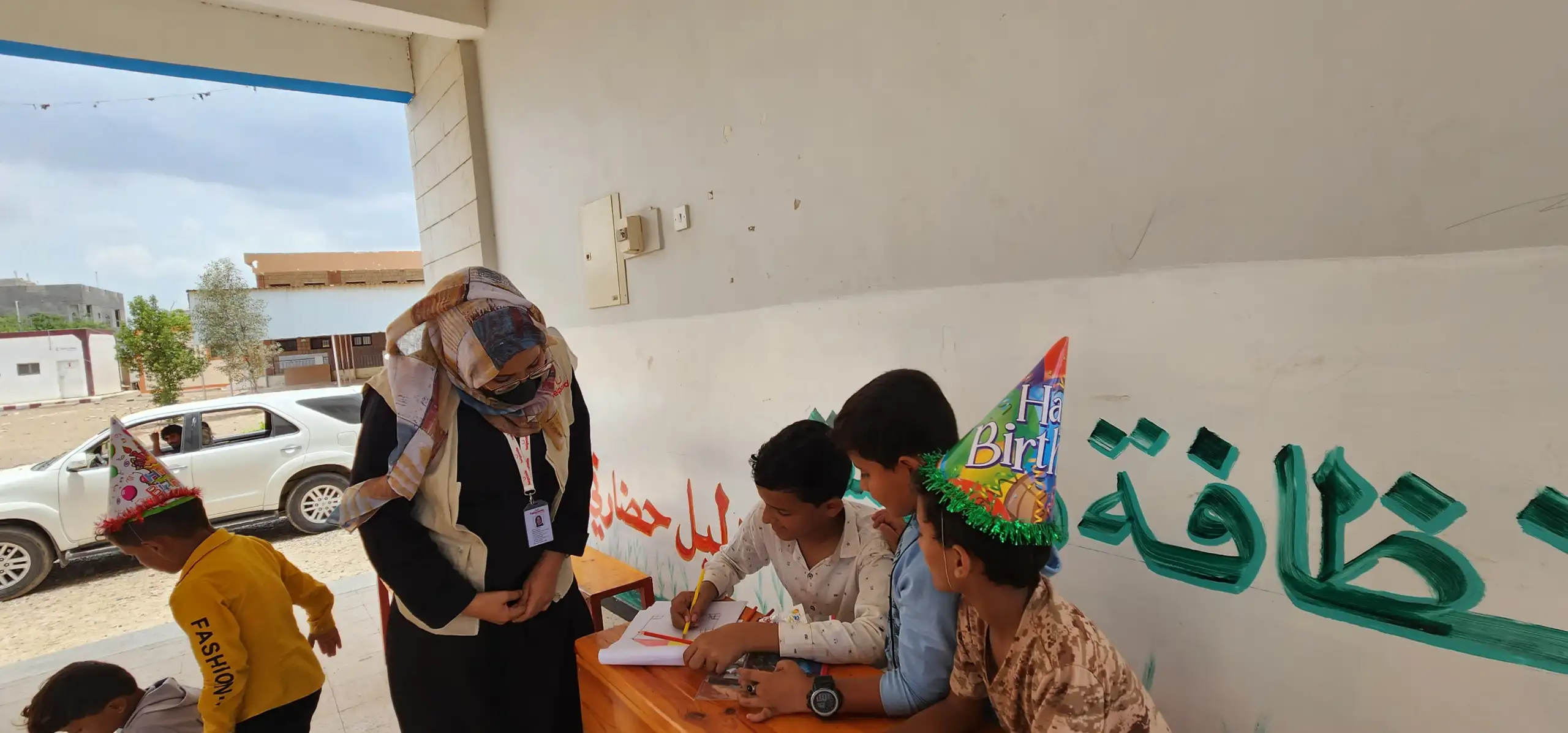
What led you to choose to work with Helpcode?
I joined Helpcode because I believe psychological support is very important in humanitarian work. Many people in our communities go through hard times, and this kind of support helps them heal and stay strong. Helpcode’s work includes psychological, social, and economic help, and this allows me to be part of different projects that really help people.
What are the biggest challenges you face in your daily work, and how do you deal with them?
One of the main challenges is reaching people in hard and sometimes unsafe places, and also dealing with the emotional stress of the job. I deal with these challenges by building trust with the people I support, working closely with my team, and organizing my time well to give the best psychological support I can.
Is there a project or result achieved together with the Helpcode team that makes you particularly proud?
I’m proud to be part of the ‘Child-Friendly Spaces’ project, which gives children affected by conflict a safe and caring place to play, learn, and heal. This helps them express their feelings and recover from difficult experiences. I also really value the programs that support families with jobs and skills, as they help improve their lives and make them more independent, which also helps their mental and social well-being.
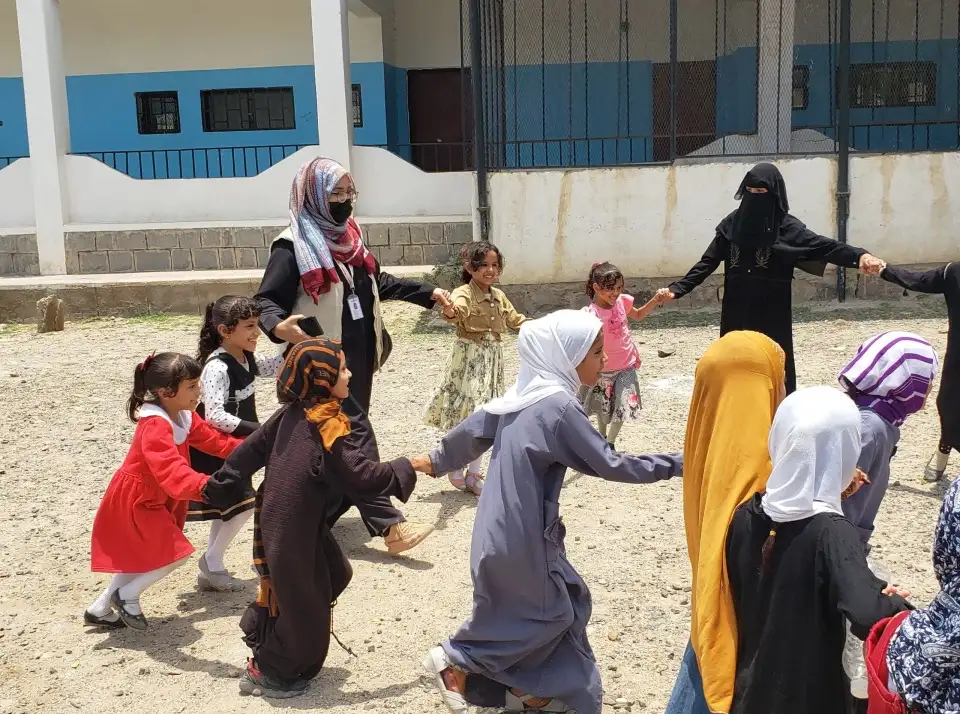
What would you like people to know about the daily work of humanitarian workers?
I want people to know that humanitarian work is not just about giving food or supplies. It also includes psychological and social support that helps the whole person. People who work in this field face many challenges, so they need to be flexible, patient, and truly want to help others. Psychological support is very important because it helps people stay strong, find hope again, and deal with problems on their own in the long run.
Mozambique: Protection and Emergency Response in Cabo Delgado
In Cabo Delgado, northern Mozambique, Natércio coordinates Helpcode’s projects in a challenging environment with multiple crises. His story reveals that humanitarian work is also about planning, collaboration, and ongoing dialogue with communities to respond effectively to their needs.
“A humanitarian worker, works like a firefighter who is always ready to help ever in difficult and adverse conditions.”
Natércio, Helpcode humanitarian worker in Mozambique
Name, role, and how many years you have been working with Helpcode
Name: Natércio Nazário
Role: Provincial Coordinator-Cabo Delgado
Working with Helpcode: 5 months
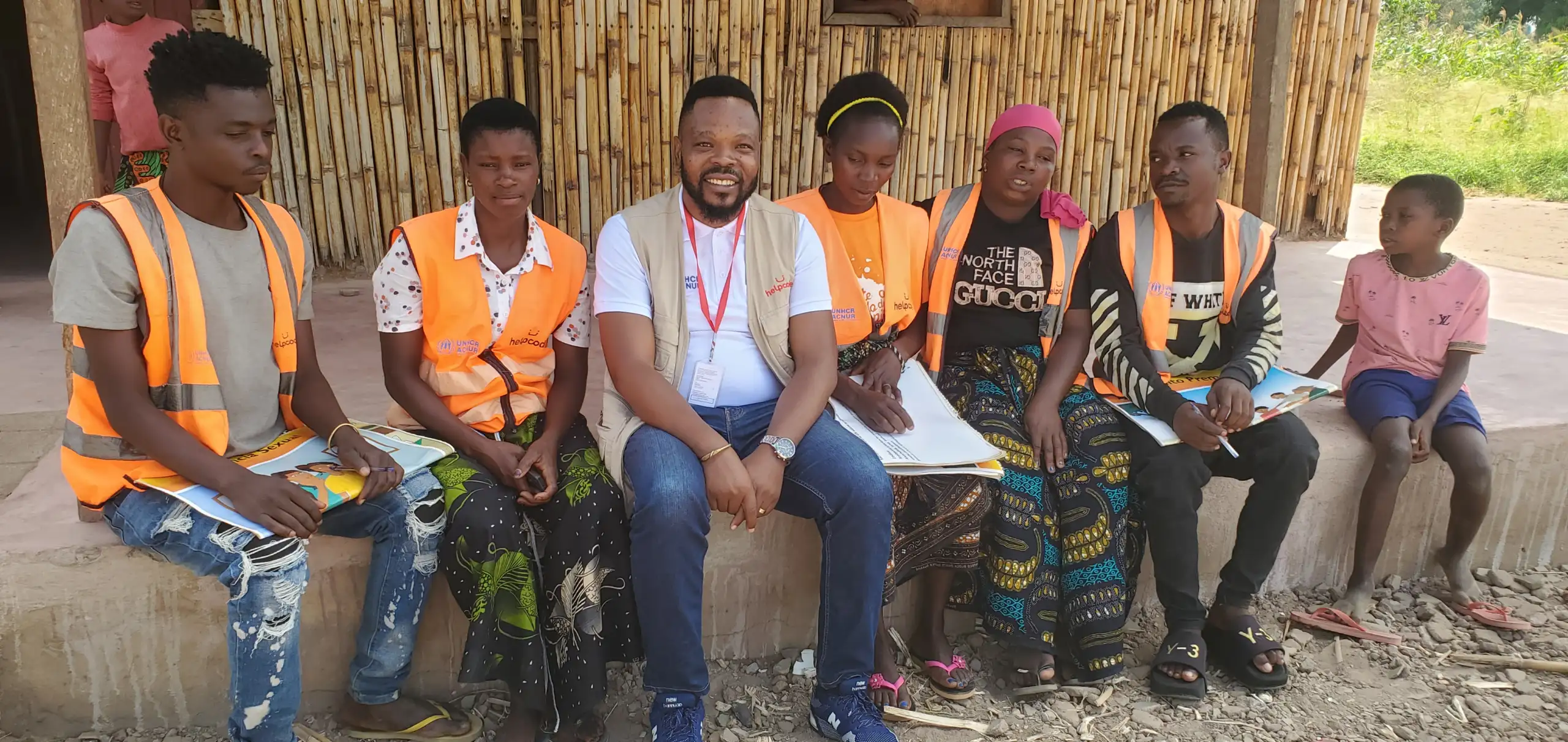
What led you to choose to work with Helpcode?
Previously I worked in the same consortium with Helpcode as a partner. I appreciated the dynamics, coordination, team work and result based, led me to choose Helpcode.
What are the biggest challenges you face in your daily work, and how do you deal with them?
The biggest daily work challenge is getting the entire team working to achieve timely results/goals in the tense environment of Cabo Delgado.
Joint planning, active and open communication with staff facilitate coordination in many aspects.
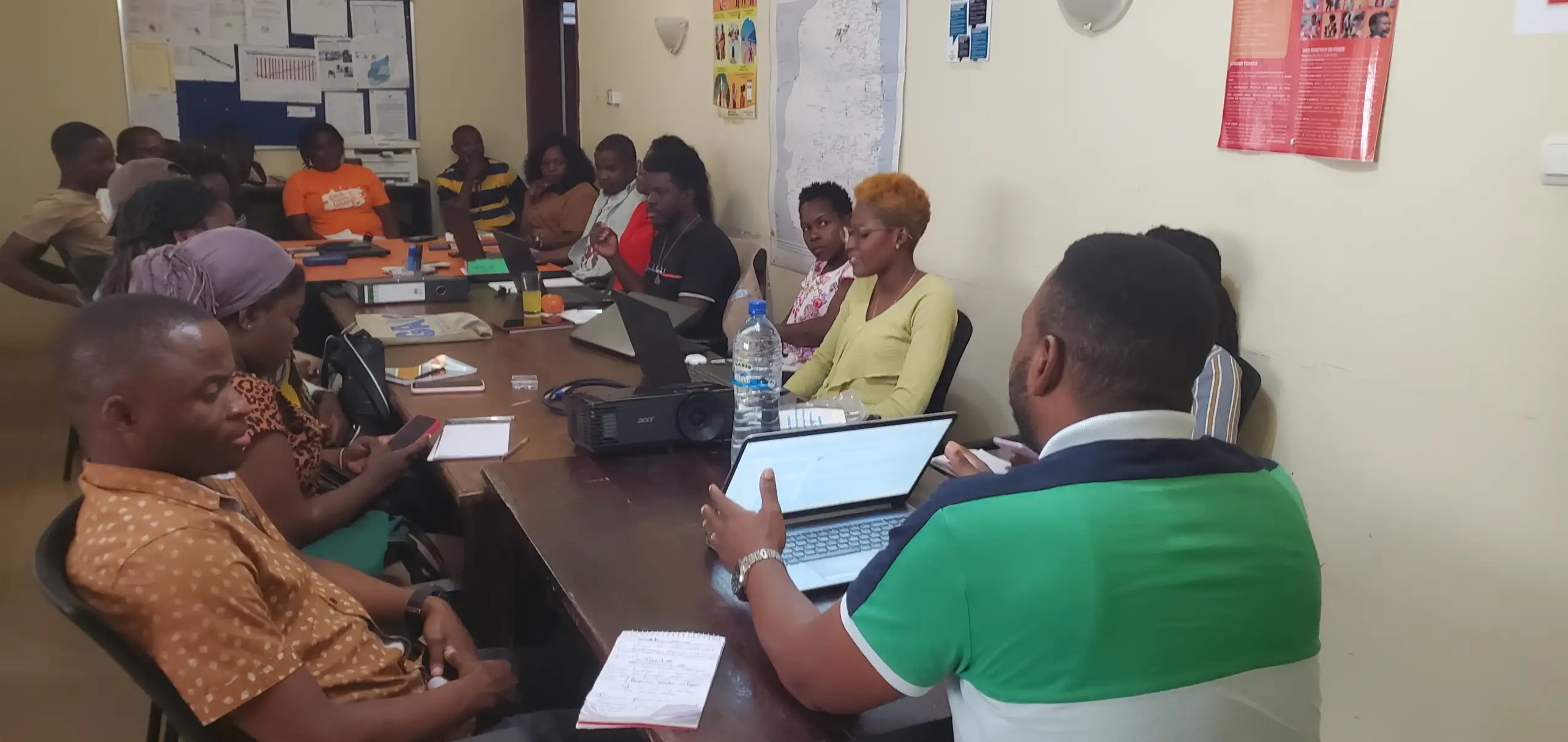
Is there a project or result achieved together with the Helpcode team that makes you particularly proud?
All the team’s achievements in various projects made me proud. Especially becoming recognized as protection and GBV experts at the provincial and protection cluster level made me proud of the team and organization.
What would you like people to know about the daily work of humanitarian workers?
I would like people to know that the daily work of humanitarian workers is based on impartiality, neutrality, independence and humanity principles.
A humanitarian worker, works like a firefighter who is always ready to help ever in difficult and adverse conditions.
Ukraine: Psychological Support and Safe Spaces for Children
In southeastern Ukraine, Sonila manages education and protection projects, even in areas close to the frontline. Her testimony reflects a daily effort of adaptation, perseverance, and attention to detail to ensure that children and families continue to access essential services despite the challenges of prolonged conflict.
“Working in a country at war means facing insecurity, constant interruptions, logistical challenges, and a heavy psychological impact on both staff and beneficiaries.”
Sonila, Helpcode humanitarian worker in Ukraine
Name, role, and how many years you have been working with Helpcode
My name is Sonila Ymeraj, and I am Program Manager for Helpcode in Ukraine. I have been working with the organization for a year and a half, coordinating humanitarian projects in the fields of education and protection.
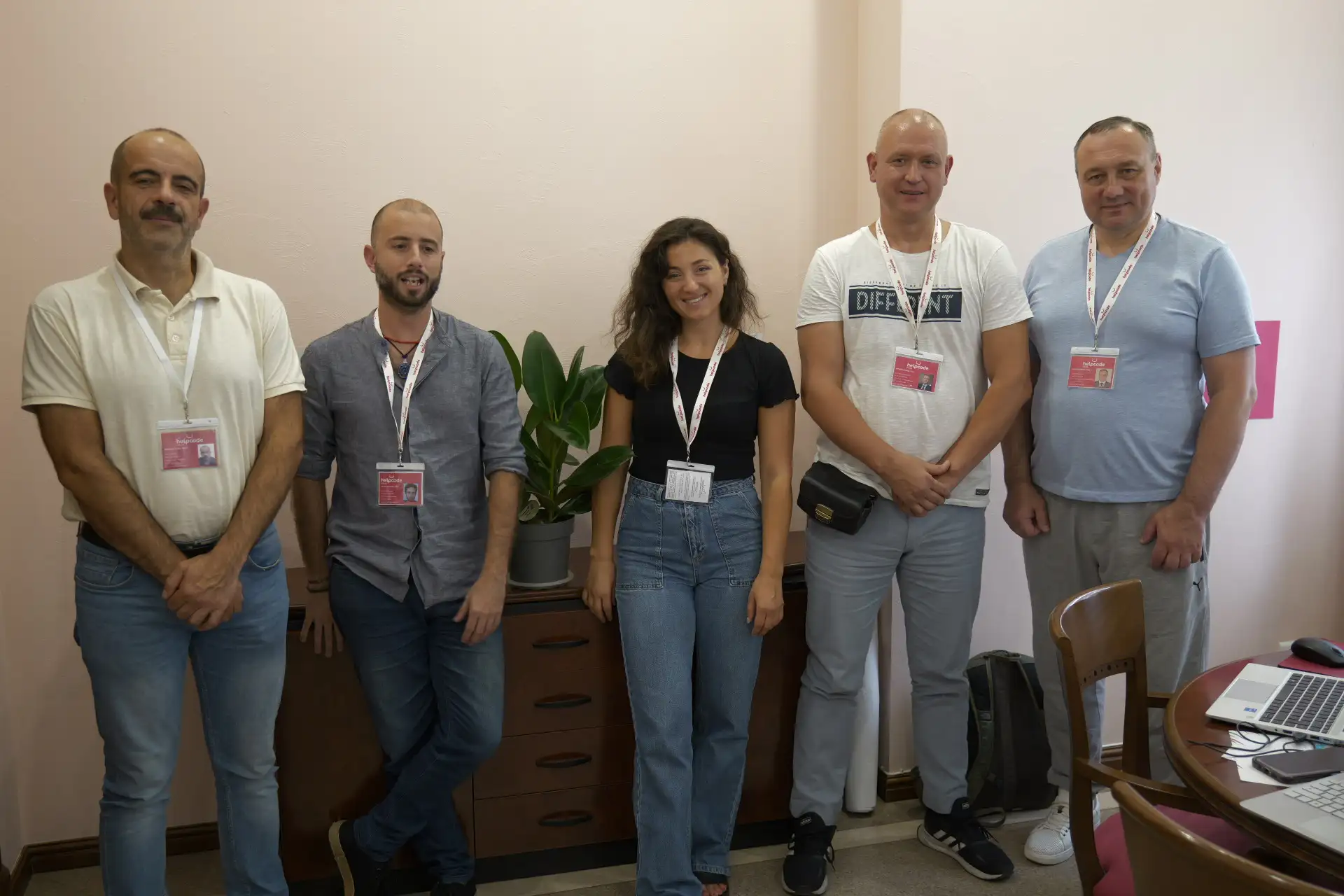
What led you to choose to work with Helpcode?
I chose Helpcode because it is a serious organization, with a pragmatic approach centered on people’s real needs. I especially appreciated its focus on education and child protection, even in emergency contexts such as Ukraine.
I decided to work with them because I found a concrete, human, and professional approach, combined with a strong ability to adapt to the most difficult contexts—without ever losing sight of people and the quality of interventions.
What are the biggest challenges you face in your daily work, and how do you deal with them?
Working in a country at war means facing insecurity, constant interruptions, logistical challenges, and a heavy psychological impact on both staff and beneficiaries.
In Ukraine, we also operate in areas close to the frontline, carrying out activities such as school renovations and psychosocial support.
These challenges are faced together with the organization and thanks to a close-knit, competent team that shares the same goals.
Is there a project or result achieved together with the Helpcode team that makes you particularly proud?
Yes, I am proud that we have managed to ensure the continuity of our activities in the country despite a very unstable context. We have achieved tangible results, reached vulnerable communities, and built sustainable interventions.
But what matters most to me is teamwork: we have built a strong team with a positive internal atmosphere, and this truly makes the difference in the success of our projects.
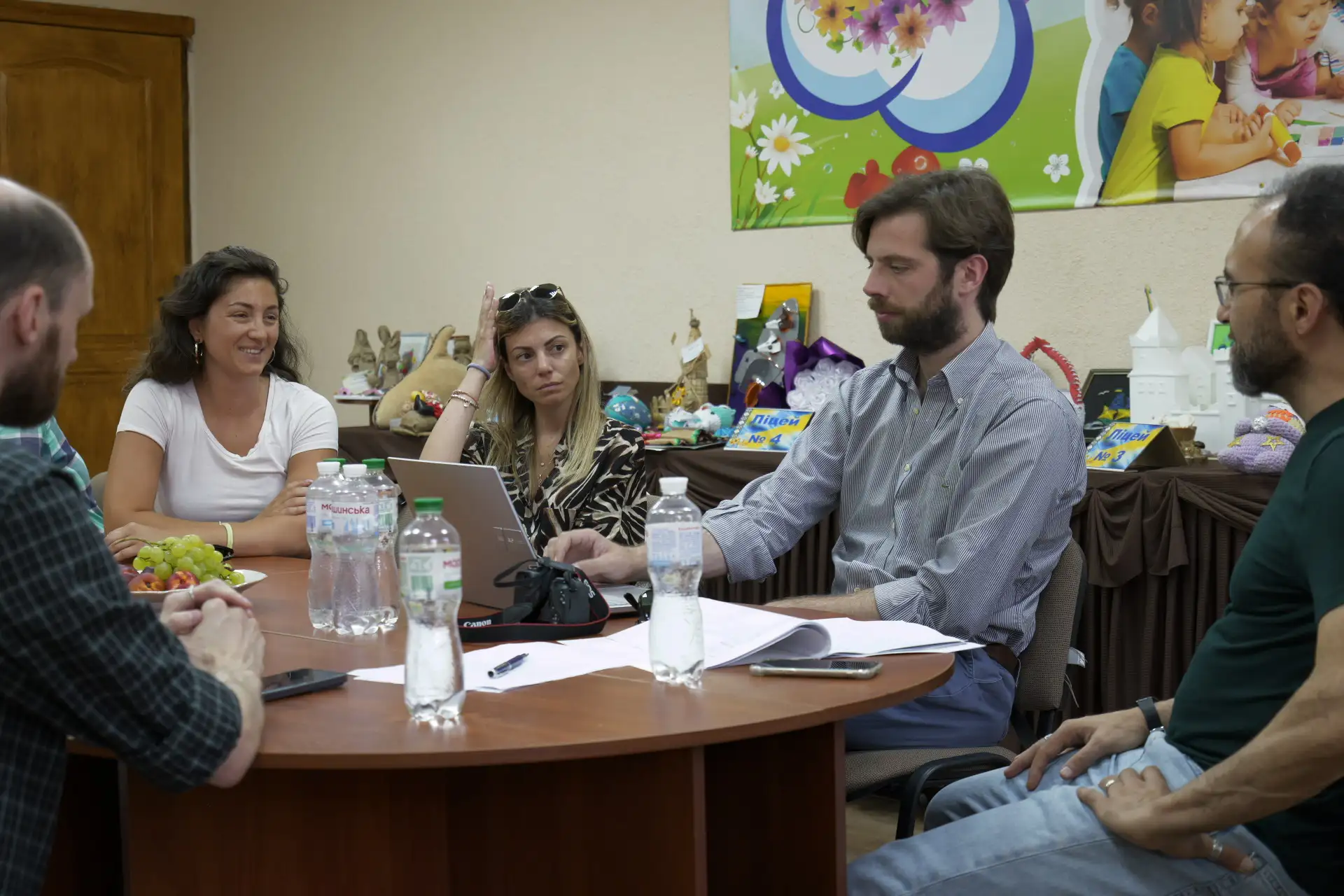
What would you like people to know about the daily work of humanitarian workers?
I would like it to be clear that this is a real job, not just voluntary work. It is a complex profession that requires technical skills, planning, management, and also a strong ability to adapt.
We often work in difficult conditions, sometimes without electricity, in emergencies, and far from our families. On top of that, there is a great responsibility towards the people we serve: every decision can have a direct impact on the lives of local communities. It is not easy, but when done with seriousness, it is work that gives meaning and helps you grow.